- Rosalía Machín, Captain of the Civil Guard: “The increase in cybercrime has risen to 46%”.
- Marta Valcarce, Deputy Public Prosecutor for Minors in Seville: “Online addiction is greater than that of tobacco or alcohol”.
- Encarni Iglesias, President of the Stop! Digital Gender Violence Association: “85% of gender-based violence takes place in the digital sphere”.
Of the 42 speakers who took part in the first edition of CSI Radar, 34 % were women. In fact, this second virtual day has had women as the protagonist with the intervention of up to nine female speakers. Women experts in cybersecurity such as Rosalía Machín from the Guardia Civil, Marta Valcarce from the Public Prosecutor’s Office, Eva Álvarez del Manzano from Edefa and Encarni Iglesias from the Stop! Digital Gender Violence Association. And across the pond, CSI Radar has reached the Dominican Republic with Eduvigis Ortiz from Women4Cyber Spain; Mexico with Aimed Pimentel, Colombia with Nazly Borrero, Puerto Rico with Xohara Ayuso and Brazil with Andréa Thomé. All of them from WOMCY.
“In three years, cybercrime has gone from 20% to 46%”.
The Guardia Civil has also intervened with the Captain and Head of Project ICT-IA and Head of Department EU Funds of the General Sub-Directorate of Information Systems and Communications for Security (SGSICS-SES) of the Ministry of the Interior, Rosalía Machín: “There are no longer male and female careers. What is valued is professionalism”. She also issues a ‘warning to SMEs’. “Small and medium-sized companies that do not invest in cybersecurity will be doomed to disappear”.
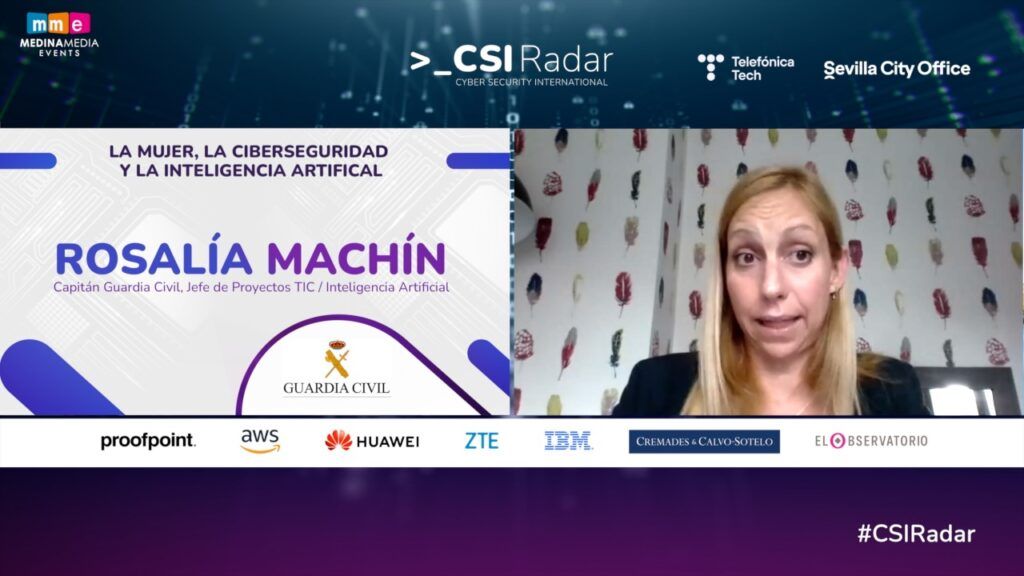
Any help is essential in the fight against cybercrime. As Machín stated, there has been a considerable increase in digital crime. “The increase in cybercrime has risen to 46%. Of the annual reports processed by the Guardia Civil, it has been detected that in three years, cybercrime has gone from 20% to 46%. The focus is also on young people. “There are kids who are bullied 24 hours a day. When we talk about cyberbullying, we are talking about cyberbullying 24/7″. In addition to this, Machín wanted to highlight another equally important case that cannot be controlled. “A child of 6-7 years old surfing the web can come across a pop-up window showing child pornography.
“Access to the net is neither controlled nor is anything demanded”.
Marta Valcarce, the Deputy Prosecutor for Minors of the Seville Public Prosecutor’s Office, spoke of the danger to which minors are exposed online. “Our young people live online. The web is their reality. They need to learn to survive in this hostile environment. It is an addiction greater than that of tobacco or alcohol“.
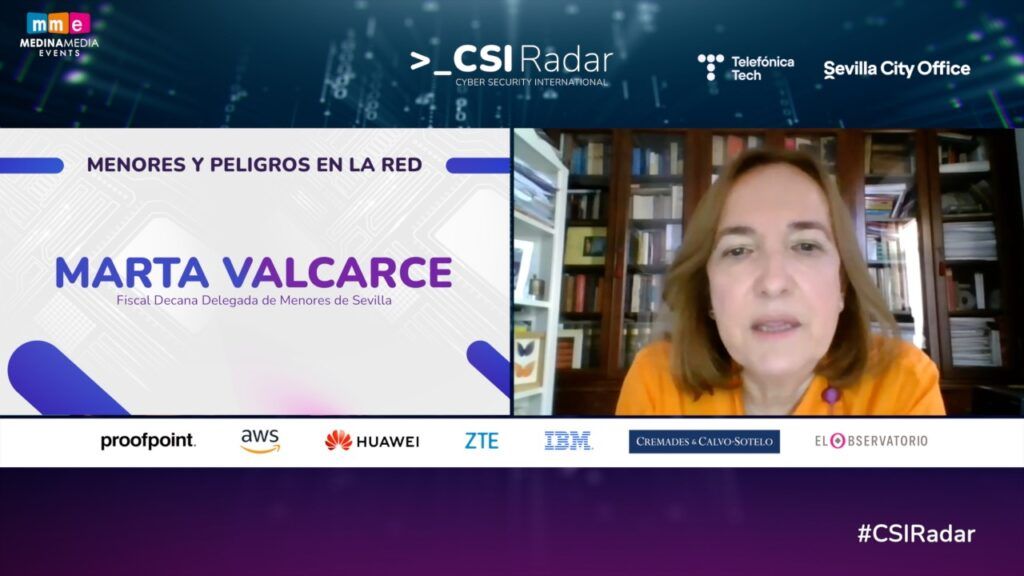
According to Valcarce, “access to the net is not controlled, nor is anything required: how is it possible that for addictive activities a minimum age is required, but on the net, in general, these controls are not established?” Furthermore, the Prosecutor considers that “the State needs to be more involved. Not only do we have to question the defence of minors as internet users, but also as victims of digital violence, either by adults or by other minors”.
The Edefa Group was also present through Eva Álvarez del Manzano, its Security Manager. She spoke about ‘classified material’. “If there is a risk that a certain type of information is known by people who should not know it, the State classifies it. If that information leaks out, you have a criminal case. Spain is a pioneer and we have many very interesting projects such as the ‘Galileo’ programme”. Álvarez del Manzano got into this field thanks to his daughter. “I started in the world of cybersecurity because I noticed that my daughter was uploading photos on Instagram from the age of 15 and had her profile open. By researching I understood all the dangers of being a teenager and being on these sites without knowing the risk”.
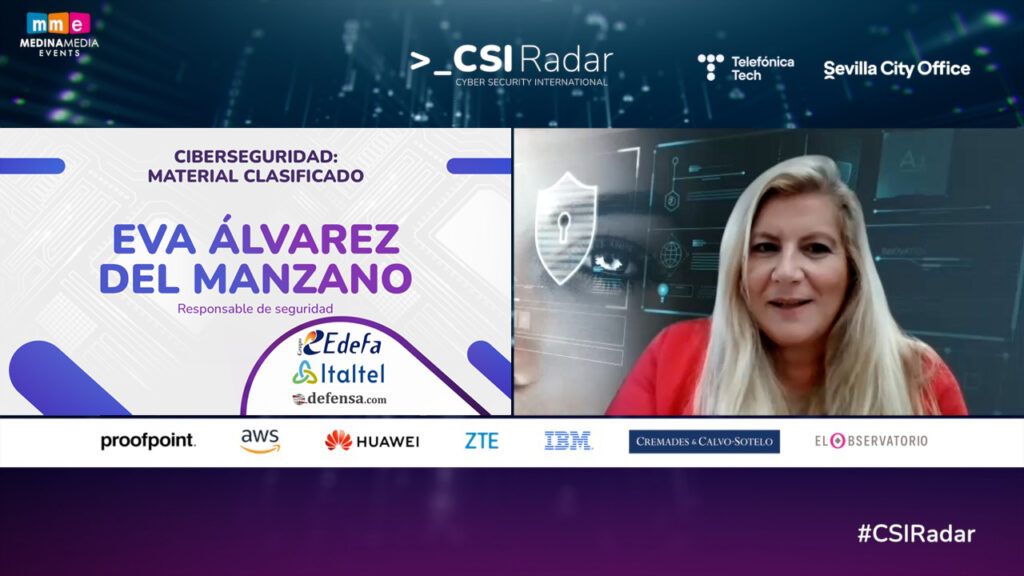
“The internet is just another tool to continue mistreating women”.
Continuing with digital violence, Encarni Iglesias, President of the Association Stop! Digital gender violence, spoke of the Internet as the tool most used in violence. “The Internet is just another tool to continue mistreating women. On it, abusers believe they are anonymous. According to the figures we know, 85% of gender-based violence takes place in a digital environment”.
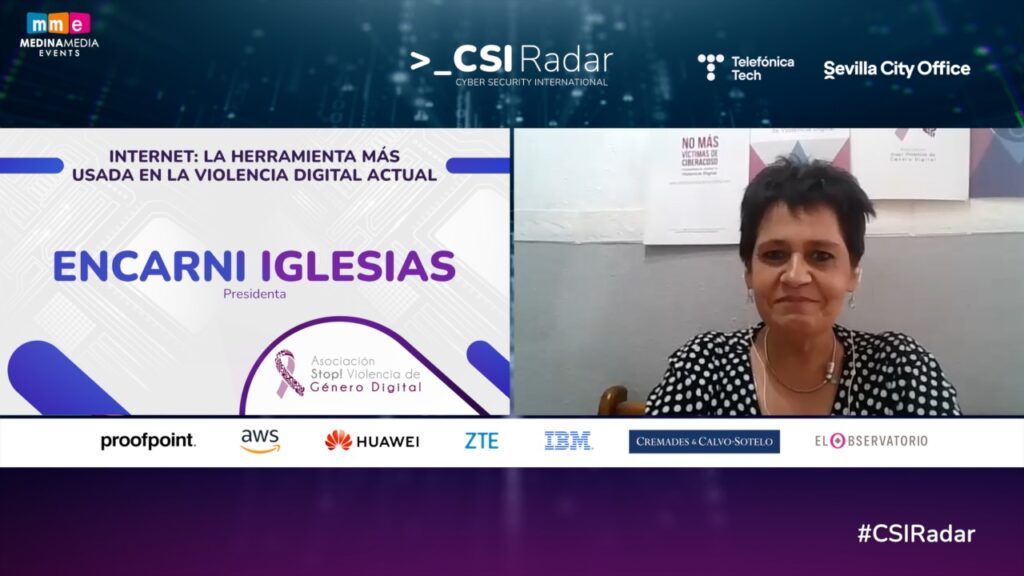
This type of violence has the particularity that “you can suffer it 24 hours a day, 7 days a week. It is an invisible violence that you don’t know where or when you can suffer it”. The situation is not very promising for the future. “We are facing a really serious problem. Suicide figures are up 38%. We are sure that the digital sphere has a lot to do with it. Sexuality is being learned through pornography and behaviours that are not normal and appropriate are normalised,” says Iglesias.
Latin American women cybersecurity experts at CSI Radar
CSI Radar has crossed the pond on this second virtual day to get the point of view of women experts in cybersecurity in Latin America. Eduvigis Ortiz, a native of the Dominican Republic and President of Women4Cyber Spain: “Our mission is to promote, encourage and support the participation of women in the field of cybersecurity and technology in general”.
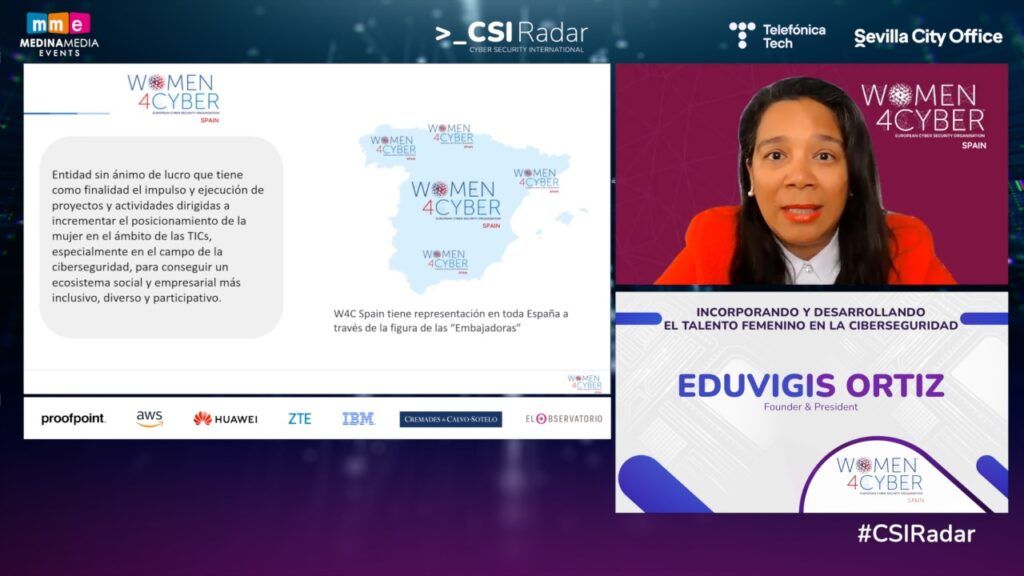
The role of women has experienced a boom in recent years. “When we started working, we were 11% women in the cybersecurity world. In the last report carried out by INCIBE last year, we are now 31%. We have almost tripled the female talent in cybersecurity. We are very proud,” said Ortiz.
The WOMCY (Latam Women in Cybersecurity) association was represented by its leaders in different parts of Latin America. Aimed Pimentel, leader from Mexico, spoke about cybersecurity in the Strategy of Organisations. “Our purpose is to design strategies that minimise risks. As we control them, we will increase our ability to act and react. Nobody wants to be in a company that can be hacked”.
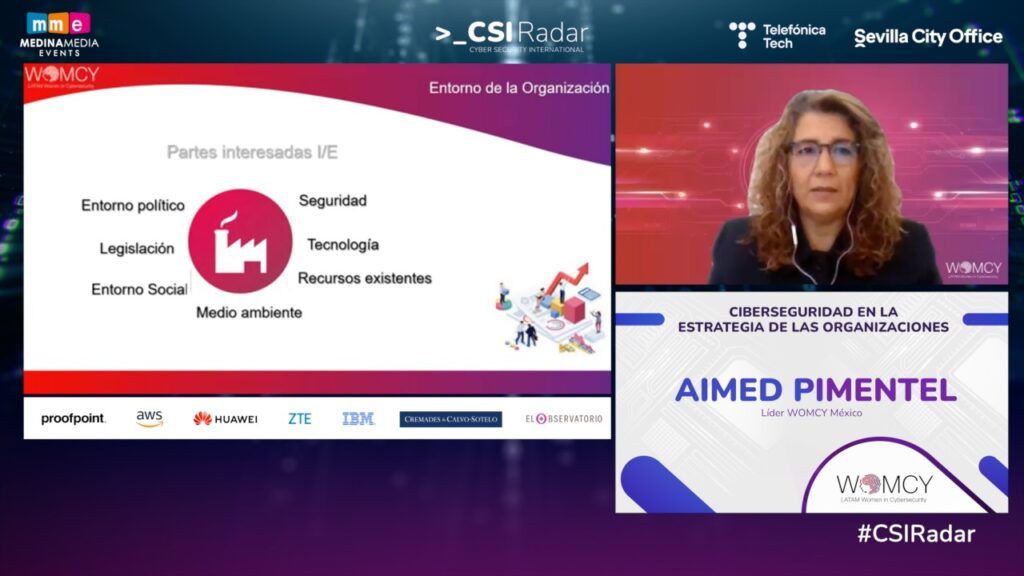
On the other hand, Andréa Thomé, Brazil Leader, commented that “globally, women earn only 77 cents for every dollar earned by men for the same work. At this rate, it will take 257 years for women to have the same economic opportunities as men“. When it comes to cybersecurity, “we lack women role models. Young women do not know that cybersecurity can be a profession that is part of a woman’s life”.
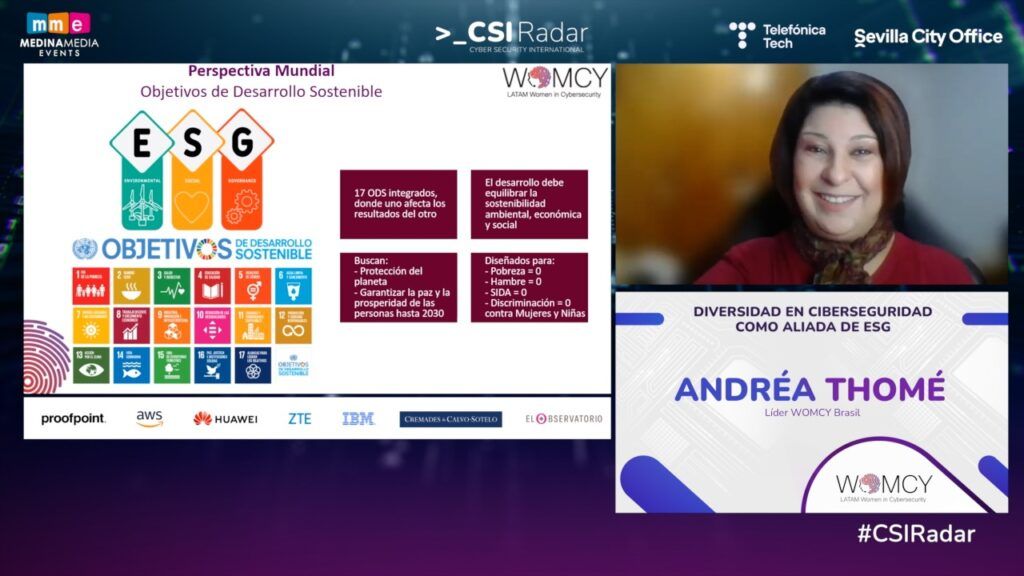
Xohara Ayuso, MCA (Multi Country Area) Leader, spoke about the importance of cybersecurity awareness. “People attacked and reported to IC3 in 2022 suffered $10.3 trillion in losses. In total over 5 years, there have been 3.26 million complaints resulting in $27.6 billion in losses.”
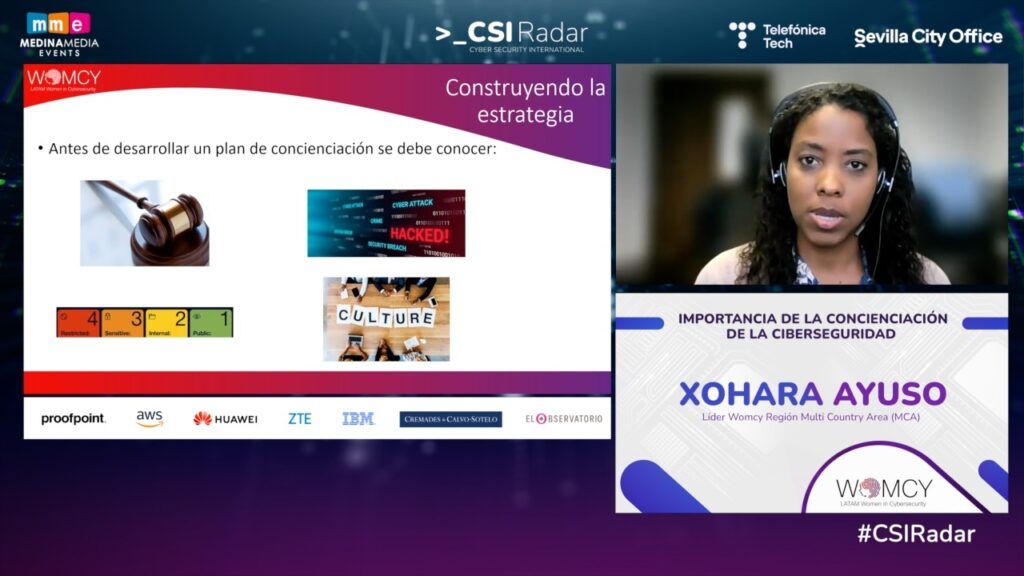
Nazly Borrero, Threat Intelligence at Cybolt and member of WOMCY, has jointly intervened with Emanuel Valle Navarrete, Computer Systems Engineer at the Escuela Superior de Cómputo (ESCOM) of the IPN (Instituto Politécnico Nacional). “Cybercrime has become the most lucrative business. When we talk about organised cybercrime, we find various types of threats. When there is no study of them, it is difficult to provide a prompt and intelligent solution for organisations,” says Borrero.
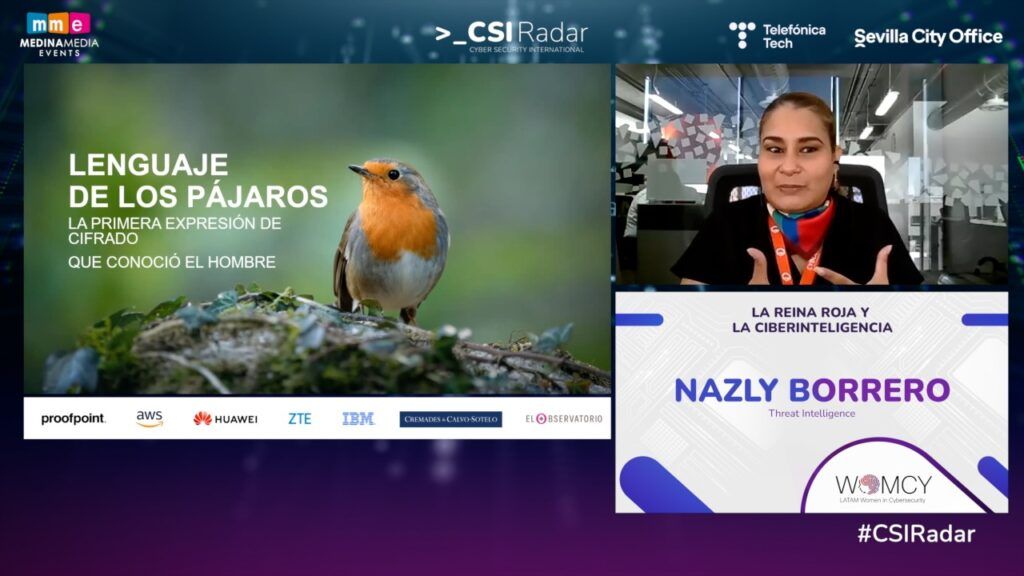
All the conferences of this day and those of the entire event can be followed on ‘El Observatorio’, a platform launched by Medina Media Events, throughout the year. This first edition of ‘CSI Radar’ is promoted by Telefónica Tech, Sevilla City Office and FIBES, and has the support of AWS, Proofpoint, Huawei, ZTE, IBM, Cremades & Calvo-Sotelo and ‘El Observatorio’.

